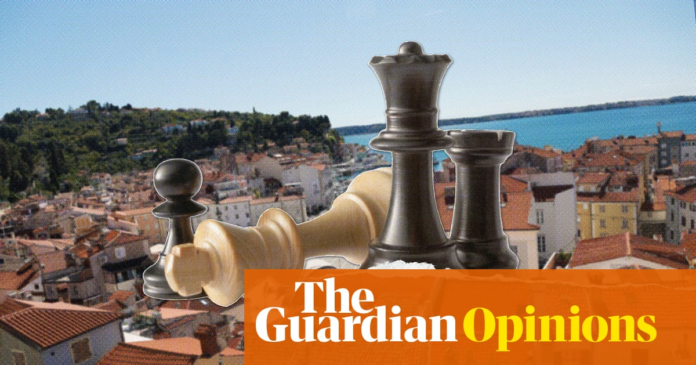Please bookmark for future updates
One hot summer in Slovenia, my cousins taught me how to jump, twirl and sashay on that black and white grid. I sensed I was spying on some ancient, fundamental truth
Enter the cliche of the Adriatic: the smell of pine trees and salt; the sound of cicadas, loud as factory machines; the sight of blue, brown and green; the splash after splash of seawater; the straw hats, linen trousers and dresses; the sun-kissed skin. Sounds amazing, doesn’t it?
This is how I remember the coast of Slovenia. Breaking open my piggy bank, gathering 700 Slovenian tolars and stuffing them into my pocket. Walking to the slaščičarna (patisserie) near the marina, ordering seven scoops of ice-cream with cream, eating hastily yet attentively, then vomiting into an oleander bush an hour later.
A couple of days after that, my father taught me to swim the crawl and butterfly so I could “outswim the bullies”, while my uncle, a marine biologist, introduced me to snorkelling so I could “see what wonders lie below”. It was also the summer my cousins resolved to teach me chess, so I wouldn’t be the only family member who didn’t know how to jump, walk, twirl or sashay on that black and white, eight by eight grid. In my family, the elders viewed knowing the intricacies of chess as essential to developing your spirit. The younger generation simply had to oblige – we had to learn. And, ideally, learn well.
Sometimes the boy cousin taught me; other times, it was the girl cousin. I enjoyed it most when they both did. They were chess club members and competitors, so learning from them together felt like being let in on a secret. Though I was very young, I sensed that I was spying on some ancient, fundamental truth. In adult terms, I felt I was glimpsing the underlying chaos of life’s possibilities – and being handed a fleeting chance to tame it.
But I wasn’t merely an observer. I was a quick learner and picked up the rules of movement for the pieces – the king, one square in any direction; the bishop, sliding diagonally; the knight, hopping in its L-shaped path; the queen, wielding the combined powers of rook and bishop; the humble pawns and their limited yet pivotal powers. My cousins taught me critical openings – the King’s Gambit, the Queen’s Gambit and the Ruy Lopez – and the English word for white; as well as the Sicilian Defence, the French Defence and the Scandinavian Defence, and the Slav word for black. They also taught me how to read the board – what to focus on and the common mistakes to avoid.
Halfway through our improvised summer course, I began poring over chess magazines. In one, I discovered the Polish Immortal, my favourite chess match to this day, played between Glucksberg and Miguel Najdorf in 1930. Many years later, it inspired scenes in my novel.
Using all that newly acquired knowledge in actual games brought me immense joy and pride. This was especially true when my cousins stopped guiding my moves or devising strategies for me. They let me decide entirely on my own. Would I be able to touch that ancient truth? Curb the chaos of possibilities? Make the best choice for me and my team – as I called the pieces – in that exact moment?
That summer of 1995, many games ended in draws, many were lost, and – thanks to my cousins’ patient teaching – a few ego-boosting checkmates were achieved. Interestingly, my victories always came when I played black. This has remained true to this day: I focus best when I open with a defence, when I am forced to react. Quite the metaphor, wouldn’t you say?
We played those chess matches along three miles of coastline between the town of Piran and the settlement of Lucija. Cross-legged under an enormous pine tree by the now-abandoned spice factory near Bernardin. On the longest pier in Portorož under the blazing midday sun (earning sunburns as proof). In the small park near the Portorož tennis courts, and after finishing a pizza con funghi in a Lucija restaurant. On the private concrete beach at Bernardin – technically for hotel guests only, though we clearly weren’t – and on the public pebbled beach of Fiesa.
But what I remember most is a match against my boy cousin on the walls of Piran. After losing, I lifted my head and took in the breathtaking view. I couldn’t see all the places where we had played that summer, but in my mind, a map had formed – a map of my best summer, etched with laughter, learning and the rhythm of the sea. A map of my home away from home. It was in these places that I began to understand a simple truth: life is both a winning and a losing game and a whole spectrum in between, and the real skill lies in learning to embrace it all. I am not claiming that I manage, but I know that that would be best for me and my team.
Ana Schnabl is a Slovenian novelist, editor and critic

